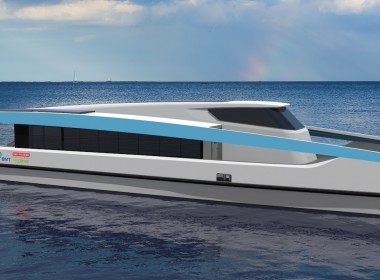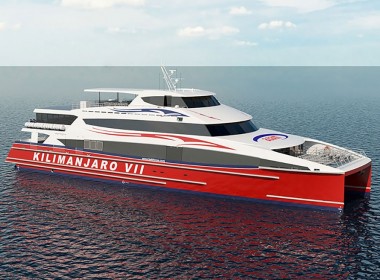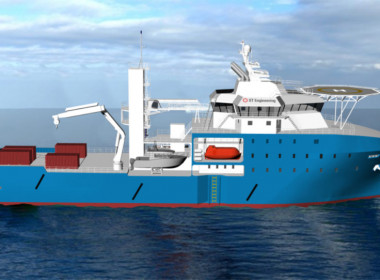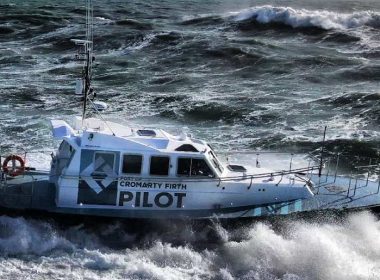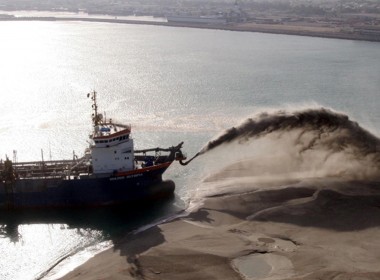AWARDS 2022 | Best Medium Ferry – Nalanda – Smart Engineering and Design Solutions

Best Medium Ferry – Nalanda – Smart Engineering and Design Solutions
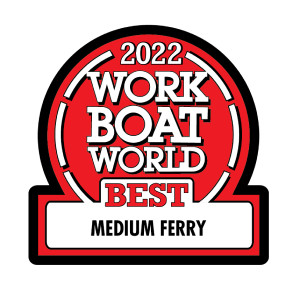
At almost 100 metres LOA, this is a substantial and versatile cargo ferry. It will serve India’s exotic Andaman and Nicobar islands in the Andaman Sea part of the Bay of Bengal.
Impressively well-equipped, safe and comfortable, this remarkable ferry is a substantial improvement on previous vessels operating in the same region.
“It is the second 500-passenger vessel in a series of four vessels for the Andaman and Nicobar Administration,” Antony Prince, Chief Executive Officer of SEDS, told Baird Maritime. “There are two 500-passenger vessels each with 150-tonne cargo capacities followed by two 1,200-passenger vessels with 1,000-tonne cargo capacities. The vessels were conceived as state-of-the-art in terms of safety and amenities.”
Prince added that while the vessels were contracted for construction in 2016, efforts were made to comply with future regulations including evacuation analysis, which came into effect much later in 2020. Since the operation is envisaged in an ecologically sensitive area, the vessels feature optimised hull forms, provisions for ballast water treatment, and diesel-electric propulsion with anti-singing propellers for low underwater radiated noise. The vessels also each have dedicated spaces for carrying perishable and refrigerated cargo as well as a large cargo hold with a crane.
“In spite of their being workhorses, the vessels offer the highest level of comfort and all modern amenities to passengers including recreation areas, prayer rooms, a hobby/game area, and a library to name a few. They also each feature a gymnasium and a bar for the crew to unwind.”
Prince said that passenger vessels are the lifeline for Andaman and Nicobar islanders as they ferry people and material on inter-island routes as well as to and from the Indian mainland. The 500-passenger vessels are regarded as welcome additions to the ageing fleet and offer modern and comfortable commuting options for the islanders.
Since the design was dual-classed, SEDS had to cater to the rules of two different classification societies, which proved challenging in the initial stages of design.
“The Indian Flag authority takes passenger vessel safety very seriously, and has additional requirements to international regulations on matters pertaining to stability, fire protection, evacuation and so on. Passenger vessels in India have to comply with deterministic damage stability requirements in addition to SOLAS probabilistic damage stability. For us as designers, this restricts the flexibility in accommodating the owner requirements.”
The designs are also highly sensitive to weight and centre of gravity. Prince said all of these made the design challenging yet interesting, resulting in a steep learning curve during development.
“With safe evacuation in mind, we designed easy-to-remember escape routes, where all occupants can take the nearest stairway, climb all the way up and move aft to reach the muster station. We developed special grillage systems to minimise primary structure weight without compromising strength aspects. We assessed vibration and noise characteristics against limits during the design stage itself to avoid issues after construction and during operation.”
For Prince, the shipbuilding industry is presently experiencing multiple technology and regulatory disruptions with decarbonisation of shipping being the most prominent.
“The industry is going through uncertain times and does not have a single solution fit for all,” he told Baird Maritime. “While multiple non-fossil fuels like ammonia, methanol, and hydrogen are proposed, there is no clarity on the availability. Owners are also looking at wind propulsion, air lubrication, hull optimisation, energy saving devices, and sometimes a combination of these options.”
Prince said 2022 was “a very busy year” for SEDS with many new enquiries from commercial and defence segments. A part from developing new ship designs, the company has become involved in retrofitting exhaust gas cleaning systems and ballast water treatment systems. SEDS also saw business in evaluating and optimising hull forms of ships and energy saving devices. The advanced engineering division, which deals with simulations in mechanics, computational fluid dynamics, acoustics and electromagnetics, saw some interesting work in multi-physics.
“There is a strong resurgence led by the cruise industry from the slump created by Covid,” Prince replied when asked about the future of the passenger vessel industry. “All market predictions indicate a steady growth in this segment. We believe that sustainable shipping practices will become the norm as users become increasingly sensitive of their carbon footprint. Digitalisation, data analytics, and artificial intelligence will be key to improving user experience and safety as well as reducing operational costs and downtime.”
Prince added that the Indian Ministry of Shipping has introduced age limits for vessels calling at Indian Ports, which he expects will have huge ramifications and will create demand for new vessels. The ministry has also notified three Indian Ports to be developed as hydrogen hubs that can generate, store, and handle green Hydrogen. Prince believes the Green Tug Transition Programme (GTTP), whose aim is the transitioning of 50 per cent of the existing tug fleet to hybrid propulsion systems (adopting non-fossil fuels like hydrogen, methanol, ammonia, etc.) by 2030, is likely to spur a lot of development in green technologies. Also, the government is actively promoting inland waterways as alternatives for the movement of passengers and cargo.
“We expect all these policies to generate demand for new sustainable vessels, especially for inland and coastal service,” Prince told Baird Maritime. “Fully electric water transportation systems are already operational in India, and we expect the numbers of such systems to grow. SEDS for its part is involved in the design of a solar-electric ferry, which is currently under construction in a local yard.”
For a list of the 2022 “Best Of” award winners, please click here.




